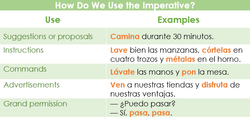Aug 18, 2022
GRAMMAR PRACTICE- SPANISH IMPERATIVE MOOD

LEARNING OUTCOMES
At the end of this lesson, students should be able to:
1. Know when to use the imperative mood in Spanish.
2. Learn the verb endings of the Spanish imperative mood.
3. Properly conjugate the spanish verbs on the imperative mood.
INTRODUCTION
There are three moods in the Spanish language and these are the indicative, imperative, and the subjunctive. For this lesson, we will be focusing on the imperative mood and the specific verb endings associated with this mood.
We use the imperative mood to require someone to do an action or directly demand an action to be performed by someone. In english we say "Get out of here" and in Spanish it's "Sal de aquí" so with this example we can notice that we are actually commanding the person we are talking to to go rather than merely suggesting that they leave.




EXAMPLE QUESTIONS
1. _____ con tu profesor ahora
A. Hablo
B. Habla
C. Hablan
D. Hablad
2. Chicos, ______ esto porque tenemos un examén mañana
A. Estudia
B. Estudio
C. Estudien
D. Estudiará
3. Oye no ______ malas palabras a los niños
A. Enseña
B. Enseñe
C. Enseñes
D. Enseñar
4. Felix por favor, no ______ alcohol
A. Tomes
B. Toma
C. Tomar
D. Tomad
5. _____ Español con Honor
A. Aprender
B. Aprendiendo
C. Aprende
D. Aprendamos
6. _____ la casa ahora
A. Limpiad
B. Limpia
C. Lumpia
D. Limpiar
7. No sé hablar Español, por favor no me _____
A. Juguen
B. Juzguen
C. Juzgar
D. Juzga
8. Ay no _____ ese helado porque es para tu hermanito
A. Coma
B. Comes
C. Comas
D. Coman
9. ______ la puerta por favor
A. Abre
B. Abres
C. Abras
D. Abran
10. _______ la palabra "PAPAYA"
A. Decimos
B. Decir
C. Digamos
D. Diciendo
ANSWER SHEET
1. B
2. C
3. C
4. A
5. C or D
6. A or B
7. B
8. C
9. A or D
10. C
LESSON SUMMARY
To use the imperative mood in Spanish, we should remember the acronym SICAG which means Suggestions, Instructions, Commands, Advertisements, and Grand permissions. Whenever you want someone to do an action for you or for someone else, we always use the imperative mood and this mood is only applicable to the pronouns tú, usted, vosotros, and ustedes.

By undefined
12 notes ・ 687 views
Spanish
Elementary